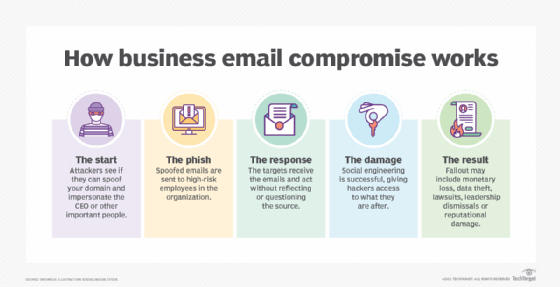virus hoax
What is a virus hoax?
A virus hoax is a false warning about a computer virus. Typically, the warning arrives in an email note or is distributed through a note in a company's internal network.
These notes are usually forwarded using distribution lists, and they will typically suggest that the recipient forward the note to other distribution lists.
If someone gets a message warning about a new virus, they can check it out by going to one of the leading websites that keep up with viruses and computer virus hoaxes. If someone sends them a note about a virus that they learn is a virus hoax, they should reply to the sender that the virus warning is a hoax.
How to identify a virus hoax
When receiving a virus alert, recipients can typically tell a hoax email by its sensational claims. For example, the malicious software would cause their hard drive to implode or the operating system to crash.
Typically, they also include fake quotes from reputable news outlets, like CNN, and cybersecurity or antivirus software providers, like Symantec, and urgent emotive language to scare the reader into taking a particular action.
In so doing, they contribute to the sender's attempts at social engineering, even though they simply believe themselves to be passing along important information.
While most virus hoaxes don't amount to more than a chain letter or a prank, there are some that urge the reader to download critical system files that could cause significant harm to the computer -- for example, the SULFNBK.exe and jdbgmgr.exe virus hoaxes.
Examples of notable virus hoaxes
A few examples of other notable virus hoaxes are the following:
- Antichrist. This hoax message stated that McAfee and Microsoft had discovered the virus that was sent via email with the subject line: "SURPRISE?!!!!!!!!!!" It then made the readers hard disk unusable.
- Irina. This was a warning sent out about a nonexistent virus by a publisher to promote an interactive book with that name.
- Black in the White House. This virus hoax carried a chain message that warned users that opening the file would unleash an Olympic torch that would burn down their C drive.
- Goodtimes. This message warned computer users that a computer virus that went by the name "Good Time" was circulating and that they should delete any email that mentioned the phrase in the subject line.
- Budweiser Frogs, aka BUDSAVER.EXE. Taken from the iconic Budweiser commercials, this supposed virus was said to steal a user's login information and corrupt their hard drive.

What to do if you receive a virus hoax message
Still, the question remains of what someone should do if they receive a virus warning. Should they assume it's a hoax and delete the message, or should they forward it just in case?
Antivirus software vendors recommend that recipients delete email virus hoax messages and not propagate the hoax by forwarding it on.
Professionally, organizations should include a nonforwarding policy for any email messages received about viruses.
It's also important to remember that virus hoaxes circulate today in more than just email. They can also be seen on social media messenger platforms. As a general rule of thumb, users should never open or forward messages or URL links that seem suspicious.
Even if the message comes from someone they know, it could be a fake account meant to impersonate that person, or it could be that the sender has fallen for a scam. It's important that it be stopped before it gets passed on to others.
Explore these ransomware removal tools and this rundown of antivirus products for Windows.







